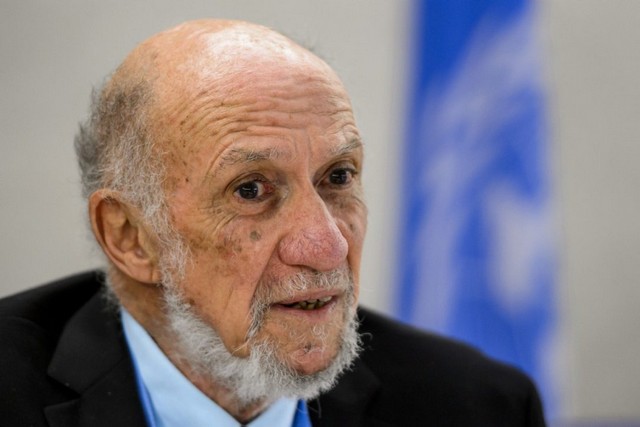By Richard Falk
To “smear critics with allegations of anti-Semitism is to confuse criticisms of Israel’s state policies with anti-Semitism,” writes international law expert Richard Falk.
In recent years, there has been an increasing tendency by Western governments and some media to deal with criticism of Israel’s treatment of Palestinians by labelling critics as anti-Semites. The tactic, pioneered and promoted by the Israeli government, is to disable and discredit the messenger, and by so doing divert attention from an unwelcome message.
This has several unfortunate consequences. Most importantly, it avoids a careful inquiry into whether the Palestinians are victims of violations of international humanitarian law. Such an inquiry is not far-fetched since they have been living in the West Bank without rights under military administration for the past 50 years.
At the same time, to smear critics with allegations of anti-Semitism is to confuse criticisms of Israel’s state policies with anti-Semitism. Of course, some critics of Israel are anti-Semites. However, very many critics, including many Jews, such as those active in Jewish Voice for Peace, are certainly not. Real anti-Semitism, which is on the rise, ranges from prejudicial attitudes and practices against Jewish people to the kind of racial hatred and persecution of Jews that reached its climax during Nazi times, culminating in the Holocaust.
It should be appreciated that Zionism, a Jewish nationalist movement, is a political project of Jewish return, with roots in the late 19th century, which from its outset was controversial among Jews for a variety of reasons. The moral and legal dilemmas confronting Zionism from its inception arose from seeking to establish a Jewish state in a society already containing a large indigenous Arab population.
Thus anti-Zionism and anti-Semitism can reflect very different attitudes. In fact, there are several examples of prominent people who are anti-Semitic although pro-Zionist. It is also a feature of the Christian Zionist movement in the U.S. to be fanatically supportive of Israel while openly hoping that Jews will leave America.
I mention these considerations as background for my own recent experience. I have been personally attacked as “anti-Semitic” and “a self-loathing Jew” following the release of a United Nations-sponsored study that I co-authored investigating whether the available evidence supported a finding that Israel was guilty of apartheid — as defined by the UN Convention on Apartheid — due to the manner by which it controlled the Palestinian population.
This was an academic study I jointly undertook with Prof. Virginia Tilley, a world class expert on apartheid as a result of widely praised scholarly work on South African racism and apartheid. Before it was released by a UN regional commission in the Middle East, our report had been reviewed separately by three anonymous distinguished jurists from around the world who each urged publication.
As authors, we understood that our study, and especially its conclusions and recommendations, would be controversial. We welcome debate and discussion. However, to ignore the analysis and defame the authors is to close off discussion, and signal that international law and the Palestinian people don’t matter if you have geopolitics on your side. To accuse me of being a self-hating Jew as well as an anti-Semite is to further evade the challenge posed by our report.
I have worked on many issues over the course of my 60 years of university teaching, but until I began dealing with Israel and Palestine a decade ago I have never experienced this kind of attack on my person rather than my ideas.
Because the allegation that I am anti-Semitic is so baseless it is often accompanied by taking my views on other issues out of context, presenting them in a distorted form. I request that anyone who considers giving credence to attacks on my character investigate the context of any unsavoury views ascribed to me.
It is my opinion that our UN study that has provoked such controversy, and can be found online, deserves serious consideration. After half a century of failed diplomacy and harsh occupation, it is time to re-examine what can be done to create the conditions for a fair and sustainable peace for both peoples.
What our study proposes is that an essential precondition for such a desirable outcome depends on dismantling present systematic structures of domination that are relied upon by Israel to control the Palestinian people as a whole, whether they live under occupation or as refugees and involuntary exiles or as a discriminated minority in Israel itself. By thinking of the situation in this way we begin to understand that the conflict is most fundamentally about people and only secondarily about territory.
It is an illusion to suppose that ending the occupation, even if achieved, would bring peace. However, ending apartheid could.
Richard Falk is professor emeritus of international law at Princeton University.
9 May 2017

